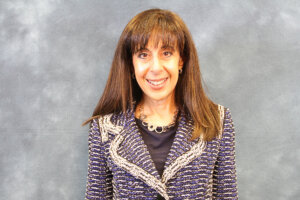Law professors are panicking about how to teach Dobbs. I use the Talmud
In an increasingly partisan society, law students in particular must learn how to respect dissenting views

Being a law professor has never been easy. Teaching about the reversal of Roe v. Wade on the other hand makes it even more complicated. Photo by iStock
Heading into the semester, law professors across the country, myself included, who were teaching courses such as constitutional law, family law and health law faced a high level of stress: This was our first semester teaching Dobbs v. Jackson Women’s Health Organization. This highly consequential Supreme Court case reversing Roe v. Wade’s constitutional right to abortion is very controversial, and most law professors, and their students, strongly disagree with its result.
I started teaching a course in family law several years ago at DePaul University. Family law can involve topics that often touch students personally and about which they feel strongly, such as same-sex marriage and custody disputes. The issues we cover usually stimulate significant class discussion, and I wanted to make sure that all my students felt comfortable speaking about sensitive matters. In thinking about how to approach Dobbs in particular, I decided to take a cue from the well-developed Talmudic tradition of encouraging respectful discourse.
In the process of getting a master’s degree in Jewish studies, I took several classes on Talmud and the Jewish legal process. In my studies, I learned that Judaism takes the power of words very seriously and prohibits verbal oppression. Many Talmudic narratives, known as aggadot, emphasize the importance of respectful debate and critical thinking. Dissenting views are recorded in the Talmud (a sign of their tremendous importance) and they are seen as a way of appropriately sharpening and challenging the majority position. These lessons are equally critical for today’s law students in our highly polarized society.
Drawing on these principles, my syllabus stated that our discussions would involve controversial topics on which people of good faith can have different opinions. I explained that I expected students would show respect for one another’s points of view both in class and on social media. I also stated that quality legal education demands that students understand both sides of an issue, even those arguments with which they disagree.
On the morning we were scheduled to discuss Dobbs, I received an email from one of my students. She implored me not to call on her that day because, as one of the few conservative and pro-life students at the school, she has learned that diversity of thought is not valued by everyone. She indicated that she has struggled with this reality since beginning law school and hoped to make it to the end of her legal studies without damaging her relationships with those classmates who disagreed with her views.
I immediately wrote back to my student telling her that I had heard this song before, and for that reason, I was planning to make student participation completely voluntary. Her email brought back memories of 2016 — the first year I taught family law, when we covered Obergefell v. Hodges, the Supreme Court case legalizing same-sex marriage. In that class, a devout Christian student asked me to refrain from calling on her because she had already endured considerable torment in her constitutional law class because of her views.
In recent years, other conservative students have confided in me that they feel as though they cannot share their views widely, or else they will be ridiculed. As many law professors know, this reality of silencing is pervasive. Its existence is not only sad but also counterproductive to quality legal education.
Law professors have a responsibility to their students to prepare them for a world in which they will encounter differing viewpoints. Students must be taught to appreciate arguments with which they disagree so they can learn how to debate these positions with respect rather than contempt.
My students knew that my legal theory of choice is what is known as cultural analysis of law. This theory embraces the view that law is shaped by culture, and culture is shaped by law. They also knew that decades ago I had written one of the first published law review articles that explicitly endorsed civil marriage and adoption for same-sex couples. Given our prior class discussion of same-sex marriage, as well as other topics where cultural norms were clearly influencing the judicial opinions we were reading, my students were likely to guess that I did not agree with the Supreme Court’s reversal of Roe. Still, I refrained from explicitly giving my opinion on Dobbs until the end of our discussion.
I pushed my students to articulate and understand the majority’s legal position in Dobbs that the Supreme Court does not have the authority to decide how states can regulate abortion because this is an issue for elected representatives. Although many students made it clear that they disagreed with the majority opinion, they engaged with its content in a respectful manner. Class participation was especially high that day.
After class, I emailed the student who had asked not to be called on and requested her assessment of the class. She indicated how much she appreciated not only my openness to all arguments, but also my willingness to challenge all arguments. She told me that although she did not speak during the class, she felt “heard” by the way I conducted the class.
Our sages gave us the tools to navigate this partisan landscape and to engage in tough, but necessary, conversations and debates. I have always understood my primary role as a law professor to be developing my students’ potential for critical legal reasoning. More recently, I have explicitly broadened this role to include modeling respectful discourse, a value I have learned from our prized Talmudic tradition.
To contact the author, email [email protected].

















